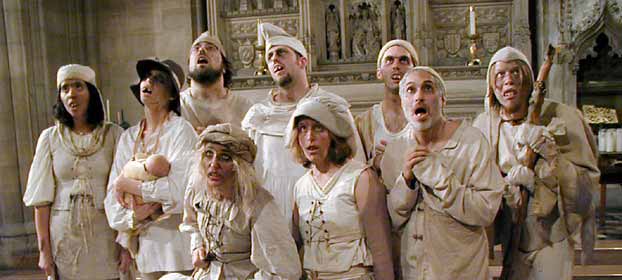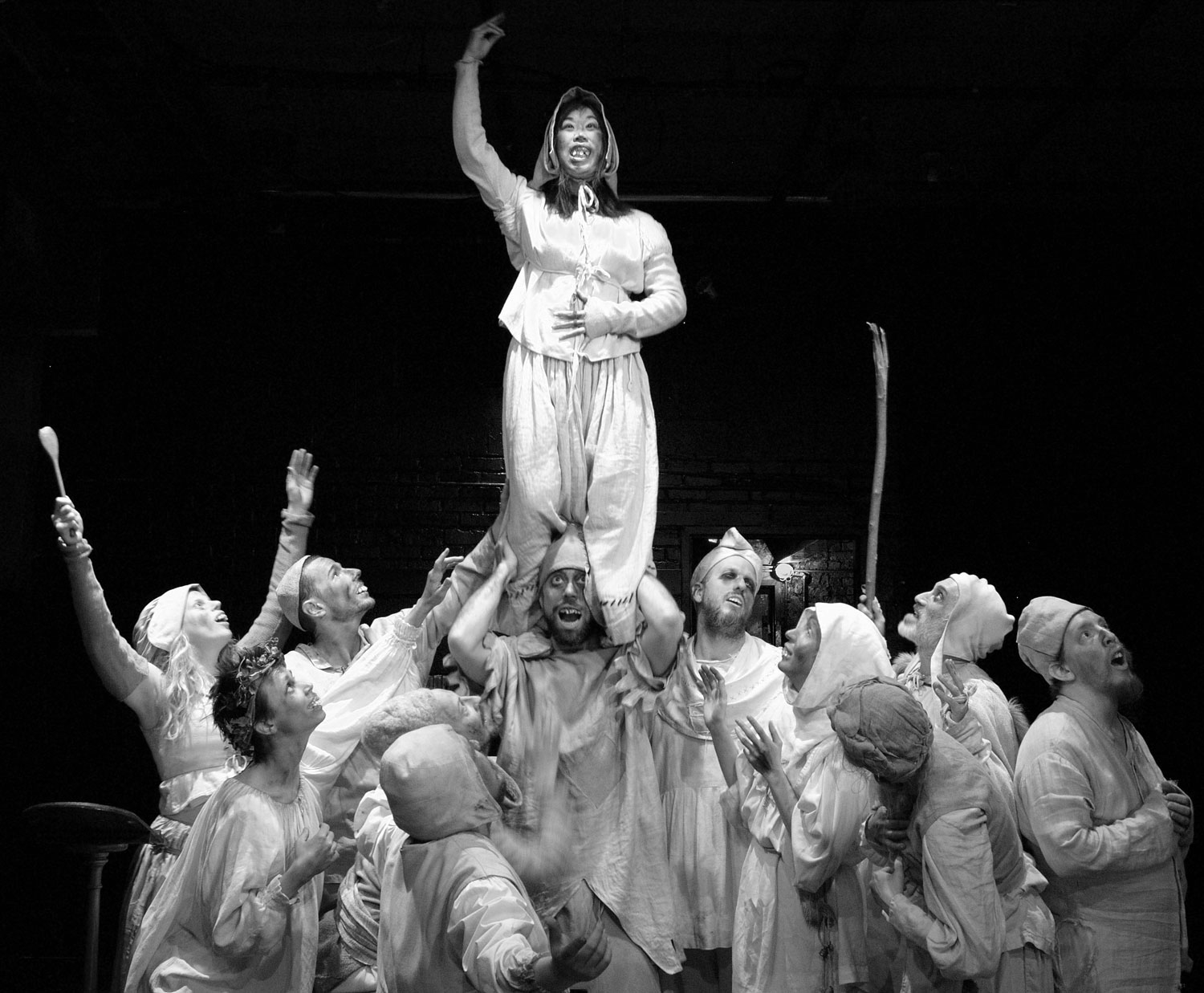
Theatre Group Dzieci, "Fools Mass"
Art has always been a sanctuary for me. As a child, drawing, painting, and sculpture cushioned me and calmed me. I created unceasingly. I lived for my art. The art was good. I, on the other hand, could not be so favorably reviewed. It wasn’t until I was much older that I realized my artistic development had left me personally stunted, completely unprepared for human interaction. A small voice called to me and suggested I investigate psychotherapy. That same voice quietly encouraged me to explore theatre as well.
There were times when this voice was respectfully heeded, and times when it was extravagantly ignored. Eventually, as if guided by divine intervention, these two areas of interest came together and led me into a direct confrontation with who I was: an introverted, anxious, and fearful young man, imbalanced, impulsive, exhibiting, along with so many other artists, a disease of the spirit. Driving myself into realms of creative urgency as if the future of all life on Earth was at stake, I would lay myself open, naked, and vulnerable, only to collapse, indefensible.
I was a prisoner of unconscious motivations, but a prisoner who now had a possibility for freedom. The solitary artist began re-creating himself through transformation and resurrection.
I write this essay, seated in my little room at the Abbey of Regina Laudis, where I am a guest for the Easter Holy Week. Whether or not I take the Gospel as history (an interesting issue, being Jewish), I am still deeply struck by the metaphor. If my inner voice represents the divine, then there is another part of me, which represents the betrayer. But just as the miracle of this celebrated event illustrates, the part that is transgressed upon does not necessarily die. The voice, the call, can be reborn.
How can I strengthen this sprig of a voice, which could shift my direction as an artist, from self-expression to self-creation?

Theatre Group Dzieci, "Fools Mass"
We have a work in Theatre Group Dzieci, informed by a research dedicated to an aim of transformation. Over the years, a methodology has come into being. The ensemble is founded on a shared observation that we cannot work alone. The strength of community is able to break down my barriers and take me beyond my self-perceived limitations. In the group, I am reminded, through other’s efforts, to remain attentive and awake. I am brought to a more complete awareness of myself, even if that awareness shows me what I am not.
Nearly four decades ago, the Polish theatre director, Jerzy Grotowski, raised the question, “Why do we sacrifice so much energy to our art?” I had certainly sacrificed. I sacrificed money, sleep, food, relationships and my health. I sacrificed to be liked, to hide behind a mask, to get away from myself and my environment. But that was before. Now this question of “Why”, for Dzieci, becomes one of “What?”
What do I sacrifice?
Again, I am moved by the analogies applicable to this holy time. I am every player in this Passion. What I need to sacrifice is nothing less than myself. My likes and dislikes. My insecurities. My tensions. My habits. Everything in me that can be destroyed must be destroyed. What is called for, ultimately, is a human sacrifice.
This is not a metaphysical activity Dzieci is concerned with. This is practical. We approach “art as service” by initially working with disadvantaged populations in hospitals and other treatment centers. We do not take this work on order in to heal (or even help) those in need. It’s done to sacrifice our false selves.
If we are singing sacred hymns by a patient’s bedside, we are required to listen, not only to each other, but also to the patient. If we fail to harmonize, we experience a suffering that erodes the ego. If we succeed, we see that it is not because of any individual. The ego is further diminished.
More questions arise. “How am I working?” “What do I serve?” “Where is my attention?”
Grotowski’s inquiry “Why do we sacrifice?” leads Dzieci to ask “What do we sacrifice?” and “How do we sacrifice?”
There is no resting place here. I am not comforted. The questions, once answered, return to be answered anew. Along the way, certain forms develop which assist us.
Dzieci utilizes oral transmission for learning music and text. We begin and end performances, workshops, hospital visits, and rehearsals in silence. We return to silence often. We share meals. We join in work with sacred communities. We eschew applause. We lead non-verbally through action and gesture. We commit to not knowing. We destroy what we create. We wear funny teeth.
For Dzieci, performance becomes an act of purification. We establish conditions that appear insurmountable, and we traverse them. We work on strengthening our attention. We expose our fears.
And we fail. Over and over again. We betray our ideals. Our God, if you will.
But if we embrace this betrayal as a natural part of ourselves, and suffer it as a natural part of ourselves, we begin to make a sacrifice. A human sacrifice. And in this simple way, we too take part in the miracle of resurrection.
Matt Mitler is director of Theatre Group Dzieci in NYC.
other paratheatre-related articles